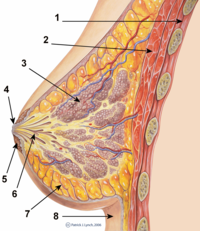
Photo from wikipedia
Menin, the protein encoded by the MEN1 gene, is abundantly expressed in the epithelial cells of mammary glands. Here, we found MEN1/menin expression slowly decreased with advancing lactation but increased… Click to show full abstract
Menin, the protein encoded by the MEN1 gene, is abundantly expressed in the epithelial cells of mammary glands. Here, we found MEN1/menin expression slowly decreased with advancing lactation but increased by the end of lactation. It happened that the number of bovine mammary epithelial cells decreases since lactation, suggesting a role of menin in the control of mammary epithelial cell growth. Indeed, reduction of menin expression through MEN1-specific siRNA transfection in the bovine mammary epithelial cells caused cell growth arrest in G1/S phase. Decreased mRNA and protein expression of Cyclin D1 was observed upon MEN1 knockdown. Furthermore, menin was confirmed to physically bind to the promoter region of Cyclin D1 through a ChIP assay, indicating that menin plays a regulatory role in mammary epithelial cell cycle progression. Moreover, lower expression of MEN1/menin induced increased epithelial cell apoptosis and caused extracellular matrix remodeling by down-regulating its associated genes, such as DSG2 and KRT5, suggesting that menin’s role may also be involved in the control of cell–cell adhesion in normal mammary glands. Taken together, our data revealed an unknown molecular function of menin in epithelial cell proliferation, which may be important in the regulation of lactation behavior of mammary glands.
Journal Title: Journal of Mammary Gland Biology and Neoplasia
Year Published: 2017
Link to full text (if available)
Share on Social Media: Sign Up to like & get
recommendations!